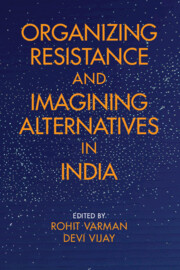Book contents
10 - A Women-Inclusive Emancipatory Alternative to Corporate Capitalism? The Case of Kerala’s State-Instituted Kudumbashree Programme
Published online by Cambridge University Press: 30 June 2022
Summary
With the ongoing advancement of capitalism, corporate capitalism – a specific variety of capitalism that is grounded in neoliberal ideology (Harvey, 2007) – has been engulfing economic and social relations worldwide (Giridharadas, 2018). Simultaneously, the search for alternatives to corporate capitalism has been ascending in both academic (Bollier, 2014; Cruz et al., 2017; Kothari and Joy, 2017; Parker et al., 2014; Wright, 2010) and non-academic circles (Cumbers, 2017; A. Ferguson, 2009). A major focus of this search has been in ‘developing’ countries like India that face the onslaught of corporate capitalism (Kothari and Joy, 2017; Shrivastava and Kothari, 2012) while being ranked 103 out of 119 countries in the Global Hunger Index. The neoliberal economic reforms introduced in India since the early 1990s have had a significant influence on developmental policies of even the states such as Kerala and West Bengal that have been governed by left-of-centre parties (for example, Communist Party of India–Marxist) (Das, 2019; Krishnamoorthy, 2010).
A central theme of inquiry on alternatives to corporate capitalism is of women-inclusive emancipation (Werlhof, 2007) and thereby the need to explore the emancipatory struggles of marginalized women who are involved in the creation of alternatives (A. Ferguson, 2009). In this chapter, we undertake such exploration through ethnographic field immersion in a programme called ‘Kudumbashree’ instituted by the Kerala state in 1998 with the objective of women empowerment and inclusion (NIPCCD, 2008).
The extant literature on Kudumbashree can be categorized into two broad streams. One stream evaluates the programme from the perspective of its ability to produce economic empowerment among women belonging to below poverty line (BPL) families, who are the primary targets for the Kudumbashree programme. This research uses traditional indicators of economic empowerment such as economic and financial asset accumulation and land productivity (for example, Agarwal, 2018; Chathukulam and Thottunkel, 2010) and finds that the Kudumbashree programme outperforms similar poverty eradication programmes elsewhere in terms of creating economic empowerment. The second stream of literature acknowledges the programme as being different from traditional anti-poverty programmes because of Kudumbashree's explicit focus on the participation of target groups in decisions that involve their livelihoods (for example, Williams et al., 2012).
- Type
- Chapter
- Information
- Organizing Resistance and Imagining Alternatives in India , pp. 318 - 354Publisher: Cambridge University PressPrint publication year: 2022



